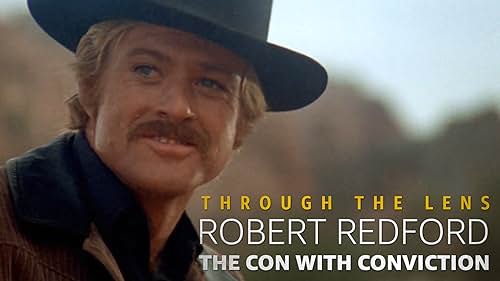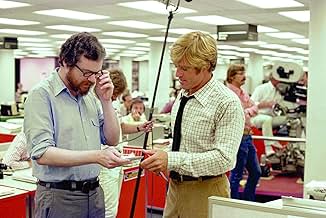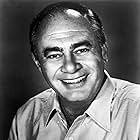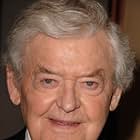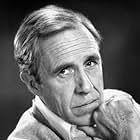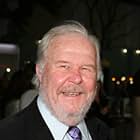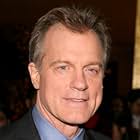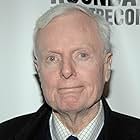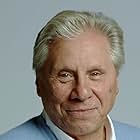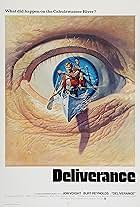Dos periodistas del Washington Post, Bob Woodward y Carl Bernstein, revelan los detalles del escándalo Watergate que condujeron a la dimisión del presidente Nixon.Dos periodistas del Washington Post, Bob Woodward y Carl Bernstein, revelan los detalles del escándalo Watergate que condujeron a la dimisión del presidente Nixon.Dos periodistas del Washington Post, Bob Woodward y Carl Bernstein, revelan los detalles del escándalo Watergate que condujeron a la dimisión del presidente Nixon.
- Ganó 4 premios Óscar
- 17 premios y 23 nominaciones en total
Argumento
¿Sabías que...?
- CuriosidadesOne scene involving Robert Redford on the phone is a continuous six-minute single take with the camera tracking in slowly. Towards the end, Redford accidentally calls the phone caller by the wrong name. But as he stays in character, it appears genuine, so the take was used in the final cut.
- PifiasIn a 2007 web discussion on Watergate, reporter Bob Woodward gave the following answer when asked for the biggest factual error in this movie: "The movie is an incredibly accurate portrait of what happened. To limit the number of characters, the city editor, Barry Sussman, was merged into another character. That is regretable, and something Carl Bernstein and I should have fought, because Sussman played a critical role in guiding and directing our reporting."
- Citas
Howard Simons: Did you call the White House press office?
Bob Woodward: I went over there; I talked to them. They said Hunt hadn't worked there for three months. Then a PR guy said this weird thing to me. He said, "I am convinced that neither Mr. Colson nor anyone else at the White House had any knowledge of, or participation in, this deplorable incident at the Democratic National Committee."
Howard Simons: Isn't that what you expect them to say?
Bob Woodward: Absolutely.
Howard Simons: So?
Bob Woodward: I never asked about Watergate. I simply asked what were Hunt's duties at the White House. They volunteered he was innocent when nobody asked if he was guilty.
Howard Simons: Be careful how you write it.
- Créditos adicionalesThe opening Warner Bros. Zooming \\' logo is in black and white.
- Versiones alternativasGerman theatrical version was cut by. ca 7,5 minutes (ie. a conversation between Rosenfeld and Simons, Woodward asking a woman about Hunt, Woodward and Bernstein being dismissed by Mrs. Hambling, Woodward on the way to a meeting with Deep Throat). DVD release is uncut.
- ConexionesEdited into La classe américaine (1993)
This is a gripping time piece. Almost half of the story is spent at the newspaper's offices, overshadowed by the permanent key-tapping of ardent typewriters and the constant chatter of young secretaries, which add a great sense of urgency and authenticity to a typical 1970s Washington workplace, where Woodward and Bernstein, sitting face-to-face in an odd, diagonal line that becomes a subtle symbol for a head-butting professional relationship, learn to first tolerate each other (and each other's egos) before uniting to unveil the truth. The interactions between Hoffman and Redford throughout the movie are as delightful to watch as they are crucial to making William Goldman's Academy Award-winning script reach its climax. We, as spectators, pay attention to these two very powerful actors' every word with such care and eagerness without even seeing through their banter and mistakes, breathing sighs of relief when catching a loose second and setting the alarm as the next one arrives. In the meantime, we get glimpses of written notes swinging in every direction from Woodward, mainly, creating a true journalistic feel, and enthralling conversations over the phone from both characters, desperately attempting to connect with not only the people behind the scandal, but also with the obscure situation on which they vainly light their lamps on, to a point where the phone becomes a mere extension of the hand and the absence of voice on the other end of the wire provokes an expression of total indifference. The story hides behind this progressive and discreet line of events without ever declaring "right" or "wrong", and plays with the writers' heads, leading them to frustration, unaided by the pressure of their superiors, the Metro News' supervisor Harry Rosenfeld (Jack Warden) and the Post's Ben Bradlee (Jason Robards, in a sublime performance).
The remainder of the movie explores Woodward and Bernstein's (or "Woodstein", as Bradlee once cries out, interrupting the high-pitched noise of the office for more than two seconds) attempts to force the truth (or, at least, parcels of it) out of various mouths (White House bookkeepers, attorneys, lawmen, you name it) and shows with true excitement the abusive paraphrasing and deduction the two men make with a less-than-minimal amount of words or simple nods from the speakers (or non-speakers). In fact, the two are so convinced of the story's credibility that they unequivocally trade sentences for common sense, really. This is where the movie falters; its will and urgency to depict these moments rapidly makes them seem trivial and forgettable. For instance, an "informant" of Woodward's ("Deep Throat", as they call him) only agrees to meet with him in a dark, underground parking, but the movie never truly gives his character the proper gravitas and importance that his name really bears, historically speaking.
Nevertheless, "All the President's Men" is the prototype of a solid and honest depiction of a historical event or, in this case, a more or less extended period of time marked by historical events. Alan J. Pakula's camera is turning around America's capital with remarkable ease, giving us the feeling that we have already been there, with Woodward and Bernstein, and capturing the charm of residential homes, the cacophony of midnight streets and the peacefulness of everyday places, such as libraries and diners. As already mentioned, the dynamics of the characters and of their relationships elevate the movie way above average, but the thoroughness to get the story "just the right way" makes it even greater. At some points during the movie, we are projected with real-time speeches from Nixon and his entourage or with journalistic coverage from 1972 and 1973 on a small television set in the office, further down the road from Woodward's small cabinet. As we exchange glances from the coverage on TV to Woodward's continuous typing, we take a step back and contemplate the successful effort of converting the broadcasted story into a much more intimate one.
- calinchiriac
- 24 jun 2017
- Enlace permanente
Selecciones populares
Detalles
- Fecha de lanzamiento
- País de origen
- Sitio oficial
- Idiomas
- Títulos en diferentes países
- Tots els homes del president
- Localizaciones del rodaje
- Empresa productora
- Ver más compañías en los créditos en IMDbPro
Taquilla
- Presupuesto
- 8.500.000 US$ (estimación)
- Recaudación en Estados Unidos y Canadá
- 70.600.000 US$
- Recaudación en todo el mundo
- 70.601.199 US$
Contribuir a esta página



